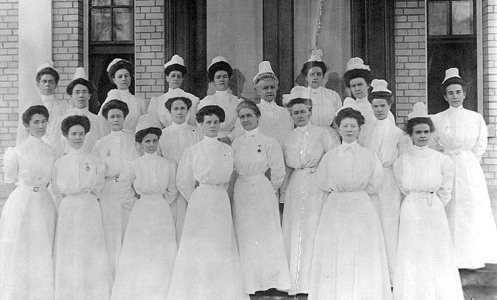Scientists and researchers are making progress in robotics everyday. Jobs that were once performed only by people are being carried out by automata. But is a robot’s capability to perform a task a good enough reason for the task to be performed by a robot? Are there some jobs that should require a human touch? Would you feel comfortable with a robot nurse?
Automation improves quality of life
One of the benefits of technology is an improved quality of life. Forklifts mean that warehouse workers don’t have to break their backs lifting heavy objects all day, cars mean commuters can sleep longer and still get to work on time, tractors let farmers do more work in a shorter amount of time. We thank technology for an easier life, but there is an unexpected effect.
People living in countries with more technology and an improved quality of life are living longer, which is great. It’s good that people are living long and healthy lives. Only, these people living long and healthy lives aren’t having as many children as those who live in societies with less technology. So, as a result the retirement population is growing, and the work force is getting smaller proportionally.
Problems come with improvements
Japan has the highest life expectancy in the world, and is one of the countries that is experiencing a rise in the retired workforce and a shortage in replacement workers. Almost 30% of the people in Japan are over the age of 65, and the average number of births per woman is just over one. It’s projected that by 2050 Japan’s population pyramid will flip, with almost 40% of the population being over 65 and just 9% being 15 years old or younger.
There are concerns not only for Japan’s workforce, but also for how to care for the elderly who are no longer able to work. One of the proposed solutions is to build robot nurses.
Japan is already experiencing a shortage of nurses, and it’s reported that a robot nurse workforce would save the country an estimated $21 billion annually. Although a fully automated robot nurse does not yet exist, there are several versions of robot nurse that do currently exist.
A big obstacle for fully automating a profession like nursing is ethical-decision making — or even plain old common sense. Sometimes decisions can’t be made by an algorithm. In one famous case in the U.S., an automatic medication-dispensing system gave 10 times the required dose, with fatal results. Sure, it was a human error that misplaced the zero, but a human nurse would have noticed the mistake in time. The automatic system didn’t have the common sense needed to catch the discrepancy.
Nursing might be one of those professions that simply can’t be done by a robot, but if it is, then Japan will be the first to know.
